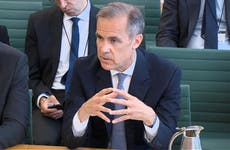UK services sector 'losing lifeblood due to Brexit', latest survey shows
Overall new work by service sector firms was one of the weakest readings seen since summer of 2016

The services industry was described as “losing its lifeblood” in May due to fears about the impact of Brexit.
The latest purchasing managers’ index came in at 54 in the month, up from 52.8 previously and higher than the 53 City of London analysts had been expecting.
Any reading above 50 indicates growth.
However, overall new work by service sector firms was still one of the weakest readings seen since the summer of 2016, with many companies reporting subdued consumer spending and Brexit-related concerns from corporate clients.
“It felt as though the sector was losing its lifeblood this month as Brexit worries continued to claw away at confidence, new orders and business margins,” said Duncan Brock of the Chartered Institute of Procurement and Supply.
Services account for around 80 per cent of the UK’s economy.
The Office for National Statistics has estimated that the sector grew by 0.3 per cent in the first quarter of 2018, down from the 0.4 per cent rate in the final quarter of 2017.
That helped to slow the overall economy down to growth of just 0.1 per cent, the weakest expansion in more than five years.
Chris Williamson of IHS Markit, which compiles the PMI survey, said the latest readings for services, construction and manufacturing were consistent with GDP growth picking up to 0.3-0.4 per cent in the second quarter.
But he added that the detail of the services survey indicates that “disappointing inflows of new work suggest that growth could wane in coming months as Brexit-related uncertainty continues to weigh on spending decisions and dampen business confidence”.
The services PMI covers sectors such as hotels, restaurants, transport, computing and finance, although not retail.
The pound was up sharply in the wake of the data, rising to $1.3375, up 0.48 per cent on the day.
Samuel Tombs of Pantheon said the latest services survey – signalling a likely bounce back in overall GDP growth – made it more likely the Bank of England would raise interest rates in August, with it having held off in May due to the first quarter growth slump.
But he added that it was “increasingly likely” that growth would fall back again in the second half of the year.
Subscribe to Independent Premium to bookmark this article
Want to bookmark your favourite articles and stories to read or reference later? Start your Independent Premium subscription today.




Join our commenting forum
Join thought-provoking conversations, follow other Independent readers and see their replies
Comments